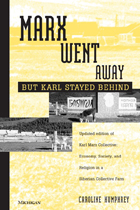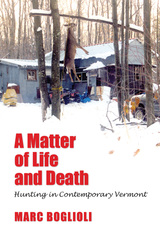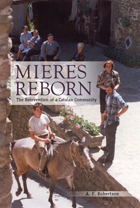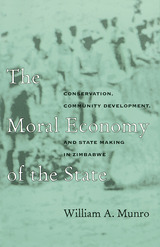122 books about Rural conditions and 4
start with M
122 books about Rural conditions and 4
122 books about Rural conditions
4 start with M start with M
4 start with M start with M

Marx Went Away--But Karl Stayed Behind
Caroline Humphrey
University of Michigan Press, 1999
When it appeared in 1983, Caroline Humphrey's Karl Marx Collective was the first detailed study of the Soviet collective farm system. Through careful ethnographic work on two collective farms operated in Buryat communities in Siberia, the author presented an absorbing--if dispiriting--account of the actual functioning of a planned economy at the local level.
Now this classic work is back in print in a revised edition that adds new material from the author's most recent research in the former Soviet Union. In two new chapters she documents what has happened to the two farms in the collapsing Russian economy. She finds that collective farms are still the dominant agricultural forms, not out of nostalgic sentiment or loyalty to the Soviet ideal, but from economic and political necessity.
Today the collectives are based on households and small groups coming together out of choice. There have been important resurgences in "traditional" thinking about kinship, genealogy, shamanism and mountain cults; and yet all of this is newly formed by its attempt to deal with post-Soviet realities.
Marx Went Away will appeal to students and scholars of anthropology, political science, economics, and sociology.
"The book should be on the shelf of every student of Soviet affairs." --Times Literary Supplement
Caroline Humphrey is Fellow of King's College and Lecturer in Social Anthropology, University of Cambridge.
Now this classic work is back in print in a revised edition that adds new material from the author's most recent research in the former Soviet Union. In two new chapters she documents what has happened to the two farms in the collapsing Russian economy. She finds that collective farms are still the dominant agricultural forms, not out of nostalgic sentiment or loyalty to the Soviet ideal, but from economic and political necessity.
Today the collectives are based on households and small groups coming together out of choice. There have been important resurgences in "traditional" thinking about kinship, genealogy, shamanism and mountain cults; and yet all of this is newly formed by its attempt to deal with post-Soviet realities.
Marx Went Away will appeal to students and scholars of anthropology, political science, economics, and sociology.
"The book should be on the shelf of every student of Soviet affairs." --Times Literary Supplement
Caroline Humphrey is Fellow of King's College and Lecturer in Social Anthropology, University of Cambridge.
[more]

A Matter of Life and Death
Hunting in Contemporary Vermont
Marc Boglioli
University of Massachusetts Press, 2009
American hunters occupy a remarkably complex place in this country's cultural and political landscape. On the one hand, they are cast as perpetrators of an anachronistic and unnecessary assault on innocent wildlife. On the other hand, they are lauded as exemplars of no-nonsense American rugged individualism. Yet despite the passion that surrounds the subject, we rarely hear the unfiltered voices of actual hunters in discussions of hunting.
In A Matter of Life and Death, anthropologist Marc Boglioli puts a human face on a group widely regarded as morally suspect, one that currently stands in the crossfire of America's so-called culture wars. Drawing on extensive ethnographic fieldwork in Addison County, Vermont, which took him from hunting camps and sporting goods stores to local bars and kitchen tables, Boglioli focuses on how contemporary hunters, women as well as men, understand their relationship to their prey. He shows how hunters' attitudes toward animals flow directly from the rural lifeways they have continued to maintain in the face of encroaching urban sensibilities. The result is a rare glimpse into a culture that experiences wild animals in a way that is at once violent, consumptive, and respectful, and that regards hunting as an enduring link to a vanishing past. It is a book that will challenge readers—hunters, non-hunters, and anti-hunters alike—to reconsider what constitutes a morally appropriate relationship with the non-human residents of this planet.
In A Matter of Life and Death, anthropologist Marc Boglioli puts a human face on a group widely regarded as morally suspect, one that currently stands in the crossfire of America's so-called culture wars. Drawing on extensive ethnographic fieldwork in Addison County, Vermont, which took him from hunting camps and sporting goods stores to local bars and kitchen tables, Boglioli focuses on how contemporary hunters, women as well as men, understand their relationship to their prey. He shows how hunters' attitudes toward animals flow directly from the rural lifeways they have continued to maintain in the face of encroaching urban sensibilities. The result is a rare glimpse into a culture that experiences wild animals in a way that is at once violent, consumptive, and respectful, and that regards hunting as an enduring link to a vanishing past. It is a book that will challenge readers—hunters, non-hunters, and anti-hunters alike—to reconsider what constitutes a morally appropriate relationship with the non-human residents of this planet.
[more]

Mieres Reborn
The Reinvention of a Catalan Community
A. F. Robertson
University of Alabama Press, 2012
Mieres Reborn reveals how patient observation and an analysis of one small community have much to tell us about human progress more generally.
Not long ago Mieres, a village in the eastern foothills of the Pyrenees, seemed destined to die. As in countless thousands of rural communities around the world, young people in Mieres over the years have moved to the towns and cities, leaving behind abandoned fields and meadows, derelict houses, and their aging and disconsolate parents and grandparents.
Close observation of this social microcosm over two decades reveals the capacity of ordinary people in a locality to reinvent themselves, reconstruct relationships with the wider world, and confront new threats to their collective survival. A. F. Robertson describes how the determination that Mieres should survive is most evident in a vigorous round of fiestas, fairs, and other public events in which natives, exiles, and newcomers work to create a lively sense of belonging. Since the 1980s, Mieres has been enlivened by a reverse flow of migrants from the cities, new settlers who have brought an infusion of youth to the community, devised new livelihoods, revitalized the village school, energized the native ”Mierencs,” and provided the impetus for a rediscovery of historical roots and political identity.
The regeneration of life in the countryside, in part a reaction to urban expansion and decay, is a global phenomenon of increasing political, economic, and social significance.
[more]

The Moral Economy of the State
Conservation, Community Development, and State-Making in Zimbabwe
William A. Munro
Ohio University Press, 1998
The Moral Economy of the State examines state formation in Zimbabwe from the colonial period through the first decade of independence. Drawing on the works of Gramsci, E. P. Thompson, and James Scott, William Munro develops a theory of “moral economy” that explores negotiations between rural citizens and state agents over legitimate state incursions in social life. This analysis demonstrates how states try to shape the meanings of citizenship for agrarian populations by redefining conceptions of the public good, property rights, and community membership. The book’s focus on the moral economy of the state offers a refreshing perspective on the difficulties experienced by postcolonial African states in building stronger state and rural institutions.
[more]
READERS
Browse our collection.
PUBLISHERS
See BiblioVault's publisher services.
STUDENT SERVICES
Files for college accessibility offices.
UChicago Accessibility Resources
home | accessibility | search | about | contact us
BiblioVault ® 2001 - 2024
The University of Chicago Press









